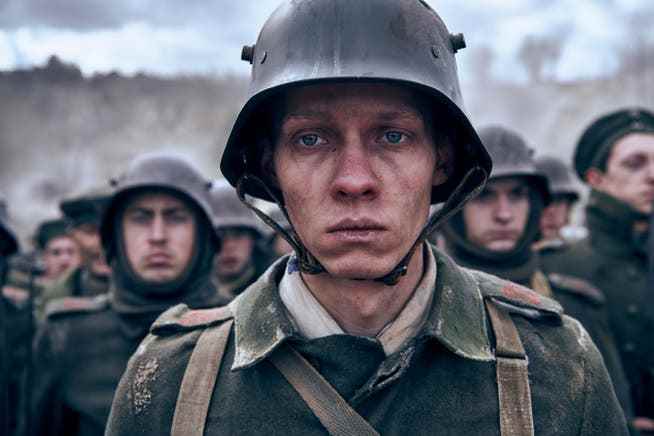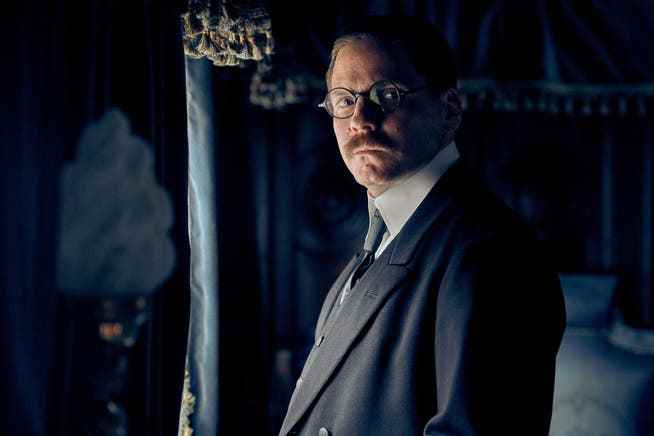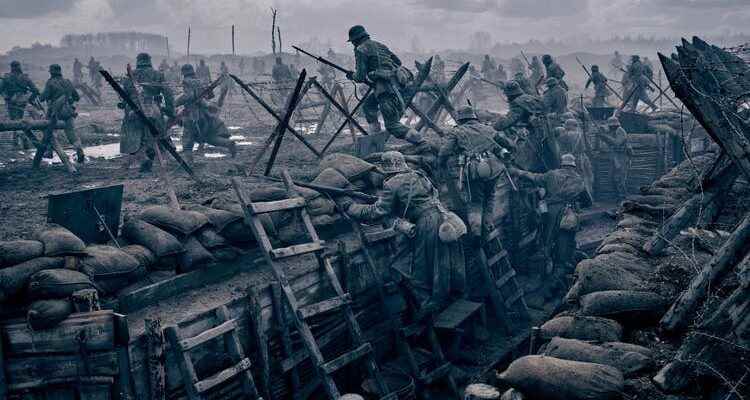For the first time, a German film team has taken on Erich Maria Remarque’s successful novel. A century after the First World War, the Netflix production reminds of a lost generation – with pathos, bang effect and many deaths.
Images of years of trench warfare that claimed 17 million lives.
This film could not have started at a more inopportune time. In the remake of «Nothing New in the West», some critics read out of sheer desperation that there was an «explosive» commentary on the Ukraine war. What else is there to say when the European present is burdened by a catastrophe that we thought had been historically overcome: war is raging.
Every cinematic attempt to portray the horror has to bounce off the reality in Ukraine – that’s one thing. The other concerns the – very German – talk of “anti-war films”, which have always been more of a sham for the peace-loving audience, because “war films” sounds more martial, but it basically makes no difference. Because, of course, every successful war film first argues against the war.
German pacifism
By the time of Remarque’s novel (1929) and Lewis Milestone’s immediately following film adaptation (awarded Oscars for Best Picture and Best Director) (1930), such works were intended to counter the militarists. German pacifism arose out of rejection of the Prussian authoritarian state. But who needs an “anti-war film” these days? Aren’t we all against war?
And yet there seems to be a perhaps incomprehensible but general need these days to see a war film, if you believe the various international charts in which “Nothing New in the West” figures among the top ten new releases.
But the civil courage of the Ukrainians in the face of the Russian attack bears no resemblance to the world power ambitions of the time, with which the patriotically blustering teacher in the film encourages his students from a saturated position. He awakens in them the supposedly heroic will to fight with the words that it is “never about the individual, but only about the whole”. The result is known. Millions of boys died in the trenches of World War I, with nothing to gain but a few hundred yards of ground.

The horror in his face: Felix Kammerer in the leading role of Paul Bäumer.
lost generation
So the high school student Paul Bäumer (Felix Kammerer) and his comrades go to war, infected by the nationalism of the war movement. The 148-minute remake by director and screenwriter Edward Berger (“Deutschland 83”) shows the sheer madness that these young men will not survive. war means hell; a lost generation is fighting here, he concludes, true to Remarque’s novel, which was banned by the Nazis at the time, as was Milestone’s film adaptation.
The apocalyptic images here tell of hunger, of men sinking into the morass, of rainwater breaking into the trenches, bursting horse corpses, a landscape abused by grenades and bombs, corpse parts and, of course, hordes of rats who, in contrast to the fighters, are lucky to be able to flee from the approaching French.
Berger visually rattles off what we already know a lot. Given the current discussion, that is not enough. Movies have a long history of origins, but perhaps in contrast to reality it is all the more clear that this film belongs to the great tradition of the war film genre from Kubrick’s “Paths of Glory” (1957) to Coppola’s “Apocalypse Now” (1979) or Spielberg’s “Saving Private Ryan» (1998) to Sam Mendes’ («1917») has nothing meaningful to contribute.
At the same time, the film awakens hope at the beginning as far as the treatment of the subject is concerned. An impressive scene represents the sobering realization that it is easier to get supplies for the wear and tear of soldiers than for the equipment of the army: the uniforms are stripped from the dead, cleaned and patched and then given to the newly recruited.
Someone already owns it, says Paul in the barracks yard when he finds a false name tag on the uniform that was issued to him. The worthless piece of cloth, the last evidence of a annihilated existence, is torn off and thrown on the ground with a heap of other little scraps. It is a gentle admonition between life and death. The film soon abandons the path of subtle observation, however, in order to plunge into endless carnage with the sounds of battle. The only way the actors can cope with this tumult is by constantly and explicitly wearing the horror on their faces.

Daniel Brühl in the role of Matthias Erzberger, a character that does not exist in Remarque.
With Daniel Brühl to the Oscars?
For the first time, the Germans are played by German actors in this third film adaptation of Remarque’s extremely popular novel. True to Netflix’s motto of filling the national markets with “native” productions.
Presumably, this circumstance is also responsible for the political framework narrative that Berger Remarque’s story creates: The figure of Erzberger, decorated with a lavishly laden fruit plate and coffee cup with a gold rim, illustrates how little the political leaders are affected by the consequences of their own decisions, while the young men in the Dig their lives like flies. And, of course, this strategic head, which the French bite on granite, already points to the later resentment of the German officers in the next war.
With Daniel Brühl (“Goodbye, Lenin!”, “The Alienist”), the role of head of the Armistice Commission has been cleverly filled with a German of international renown. Equipped in this way, “Nothing New in the West” is now in the running as an Oscar contender for the best international film (which was still called best foreign language film until 2019).
Pathos and bang effect
Netflix is clever at this. This adaptation of Remarque’s great contemporary document about a German generation wiped out by the war may count as flat-chested entertainment, but in the use of clichés, pathos and bang effect it corresponds to the literary original. A tangible contribution to what war means to the individual, the film remains disappointingly speechless in the face of current events.
«Nothing New in the West», directed by Edward Berger; Screenplay: Lesley Paterson, Edward Berger, Ian Stokell; Actors: Felix Kammerer, Albrecht Schuch, Aaron Hilmer, Daniel Brühl, Devid Striesow. Netflix.
